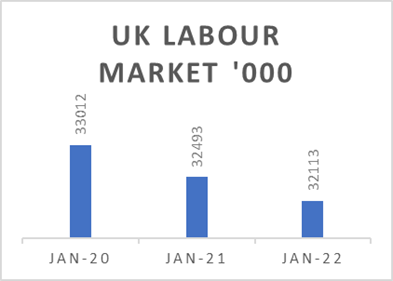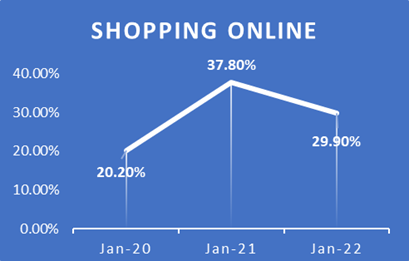New work, new life, new normal and beyond?
Sports bras and meat-free sausages are in, men’s suits and doughnuts are out. Working from home in the pandemic has changed us.
So believes the Office for National Statistics (ONS) in changes recently made to the basket of items used to calculate the UK rate of inflation. Dr. Mark Pegg explores the data from Google’s Community Mobility Reports to see how our behaviors have evolved.
With the end of COVID-19 regulations, everyone hopes for a steady return to normal, although it is a widely shared view that this new normal will be different. But what will it look like? How is the world of work being re-engineered by workers and business alike? How has consumer choice changed? How has consumer choice changed the way we use our leisure time? Lets look at the data and see if it sheds more light on the way ahead.
We are still spending lots more time at home
Going out is on a slow but fragile upward trend vulnerable to sharp rises in petrol prices and travel fares. Commuting is rising, but anyone viewing a station car park can see a return to previous levels has yet to occur. Footfall at railway stations and offices is still down by more than 20% compared with pre-COVID-19 levels. During the peak of lockdowns up to 60% of adult workers were working from home, falling gradually to just over 30% today. Survey evidence suggests some 25% of us will continue to work at home permanently or occasionally: the hybrid model of home office working is here to stay.

Dramatic things are happening in the workforce
The UK labour market shrank by nearly a million people and businesses that can only be done face to face are facing chronic labour shortages particularly hospitality, agriculture, medical practice and health care. It is difficult to see these vacancies filled without major changes to increase their attractiveness – better pay, working hours and working practices which will increase costs. These changes have barely begun.
Many of us have relocated
The data shows a shift from town to country, seeking more home office and garden space, aided by a stamp duty holiday. If we take London alone, those moving out rose sharply with properties purchased away from the capital rising from close to 70,000 in 2020 to well over 110,000 in 2021. Hamptons Estate Agents said 2021 saw, the single largest migration out of London in a generation.
Spending patterns have changed radically
Predictably spending on travel and holidays, on entertainment and going out remains well down. Instead, we are eating at home, staying local, opting for staycations. The travel industry hopes for a summer rebound where pent-up demand for overseas holidays is unleashed, but it has not happened yet. As London Gatwick South Terminal reopens and restrictions on foreign travel ease, ONS data shows flights have only recently recovered to some 60% of pre-pandemic levels. Having been massively depressed, the fragile recovery in leisure spending is now bumping up hard against inflation and cost of living pressures intensified by the aftermath of supply chain disruption, Brexit and war in Ukraine.

We all know there has been a revolution in retail
Long term trends accelerated in lockdown, online sales jumped sharply to a peak in 2021 and are still running at a third of sales. This sharp reduction in footfall also impacts on the ancillary things that go with an enjoyable shopping trip, including entertainment, eating and drinking which have continued to suffer grievously. The British are staying home, streaming films, eating in and staying local.
If we couldnt spend, did we save?
It is a polarised picture: for the haves this rose sharply, but for the have nots it fell equally sharply. A Bank of England survey in late 2020 showed 42% of workers in high income households increased their savings from the start of the pandemic; for low-income households this was only 22%. COVID-19 hit hard right across the income scales, many workers took major hits on income and spent all their savings just to survive and many did far worse - losing their jobs and their savings.
Basic assumptions of how people share and work together have changed
Increased exposure to information technology changed basic assumptions about how people share and work together. Many possibilities existed well before the pandemic but being obliged to use them has created a step change in thinking, leading to major behavioural change. Habituation – familiarity and acceptance - occurred, more of us got used to remote working tools where mass attitudes towards communications and information sharing changed for ever. True, some remain sceptical, some are resolute non-believers and as social animals we all know something valuable is missing in an online world, but taken together, deep-seated changes that were taking years to achieve were done in weeks or even days to create a new normal that is very, very different.
There is a final twist
Many believe UK society is already moving beyond even this iteration. A further paradigm shift, ever more creative and innovative ways of connecting us together, of different human relationships, of new realities, new businesses and services and new realities, of artificial intelligence and Mark Zuckerbergs Metaverse - totally new forms of life, work and leisure that few had dreamed of before.
Author: Dr Mark Pegg, Director, Chalfont Associates